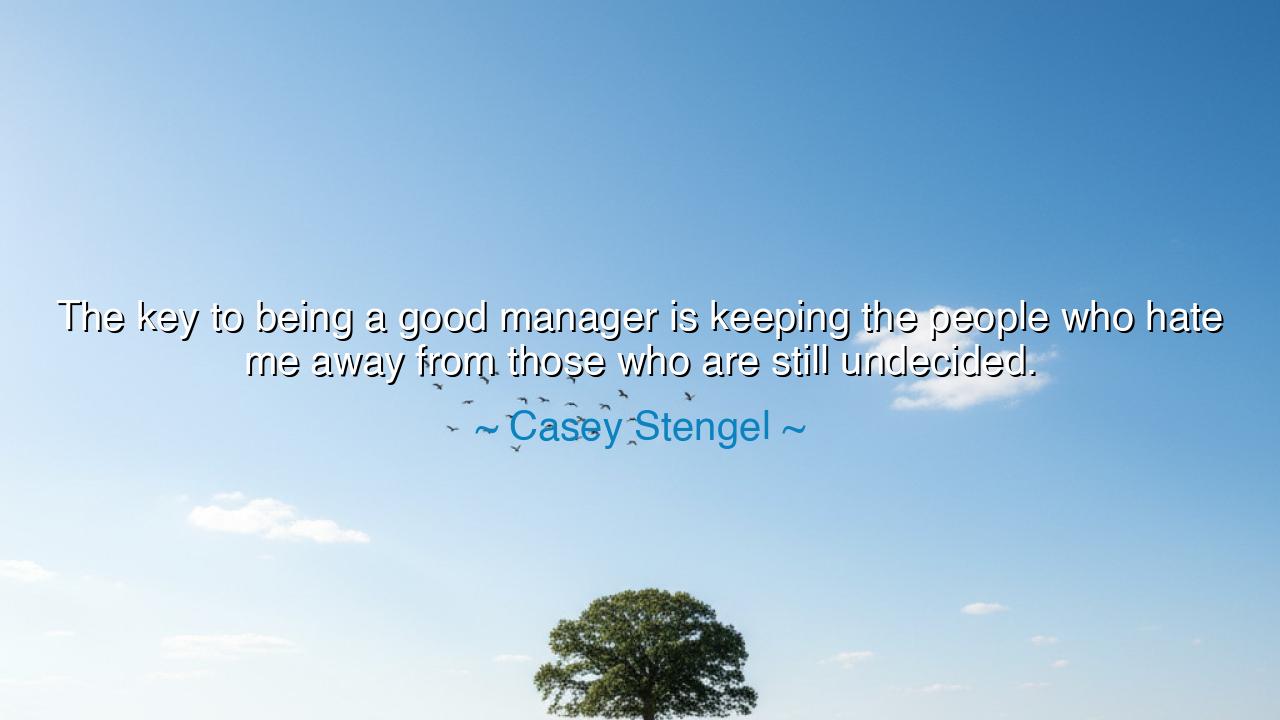
The key to being a good manager is keeping the people who hate me
The key to being a good manager is keeping the people who hate me away from those who are still undecided.






“The key to being a good manager is keeping the people who hate me away from those who are still undecided.” Thus spoke Casey Stengel, the legendary baseball manager whose humor often hid the sharp edge of truth. His words, though wrapped in jest, contain a wisdom as old as leadership itself—a truth about human nature, loyalty, and the subtle art of influence. For though the field of Stengel’s wisdom was baseball, his insight stretches far beyond the diamond. He understood that in every company, every kingdom, every tribe, the leader’s first challenge is not strategy, but spirit—the unseen current of belief that binds people together or tears them apart.
In these words lies a lesson about morale and influence, the invisible forces that can make or break any endeavor. Every leader stands between two kinds of followers: those who believe in him, and those who do not. Between them lies a fragile group—the undecided, those whose faith can be swayed by what they hear and see. Stengel, who had seen teams rise and fall not merely from skill but from unity, knew that the poison of cynicism spreads faster than the seed of faith. Thus, he spoke half in humor, half in warning: guard the minds of the wavering, for negativity is a contagion that can rot even the strongest ranks from within.
Casey Stengel himself lived through both adoration and ridicule. As the manager of the New York Yankees in the mid-twentieth century, he led his team to seven World Series championships, commanding both respect and resentment. His style was unorthodox—colorful, unpredictable, and often misunderstood. There were players who adored him, who found in his eccentric brilliance a source of inspiration; and there were others who despised his methods, calling him confusing, stubborn, even mad. Yet Stengel understood what few did: a leader cannot afford to let the voices of bitterness mingle unchecked with the hearts of the impressionable. To lead is to protect belief—to shield the fire of trust until it burns strong enough to withstand the winds of doubt.
This wisdom is not new. In the annals of ancient leadership, we see the same truth reflected in the councils of kings and generals. Alexander the Great, though a master of conquest, was ruthless in guarding the loyalty of his army. When rumors arose or factions began to fester, he acted swiftly—not always with punishment, but with clarity and control. He knew that dissent, left unattended, could corrode even the mightiest army. The same principle that guided Stengel guided Alexander: leadership is not only about victory—it is about the preservation of faith within those who follow.
Yet there is a deeper layer still. Stengel’s quote is not merely about silencing criticism or shielding oneself from opposition—it is about wisdom in human management. The wise leader does not wage war against his critics, for hatred cannot be conquered by hatred. Instead, he separates those in despair from those still uncertain, giving himself time to win the undecided through proof, through patience, through success. He understands that trust is not commanded—it is cultivated. The undecided are the soil of tomorrow’s loyalty, and the leader must guard that soil from the weeds of discontent until his deeds can speak louder than his doubters.
In truth, every leader—be it a parent, a teacher, or a captain—faces this same challenge. There will always be those who oppose you, who misunderstand you, who mock your methods. Their voices, sharp as daggers, can pierce the confidence of those still finding their faith. The foolish leader argues with them; the wise one keeps their bitterness from spreading. He does not feed the flame of division but tends the quiet fire of conviction among those still willing to believe. For the leader’s greatest victory is not over his enemies, but over doubt itself.
Therefore, O seeker of wisdom, learn this from Casey Stengel: guard the spirit of your people as carefully as a shepherd guards his flock. When negativity arises, contain it; when faith flickers, shield it. Do not waste your strength fighting those who already despise you—invest it in those who still stand beside you. Let your actions speak where argument fails. In time, your success will silence the critics, and your steadfastness will win the hearts of the wavering.
The lesson is clear: Leadership is not only the art of commanding action—it is the art of preserving belief. Keep those who hate you from infecting those who might still follow you, not through cruelty, but through wisdom and focus. Build the faith of your people until it stands unshaken, for once their hearts are yours, no voice of opposition can divide them. In this, as Stengel taught with both humor and truth, lies the key to being not just a good manager—but a great leader.






AAdministratorAdministrator
Welcome, honored guests. Please leave a comment, we will respond soon